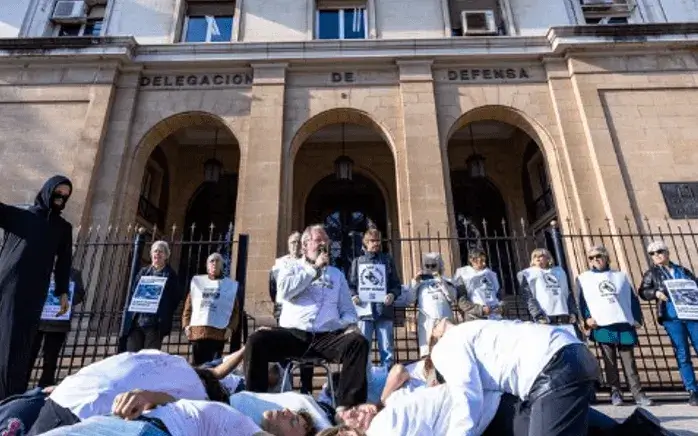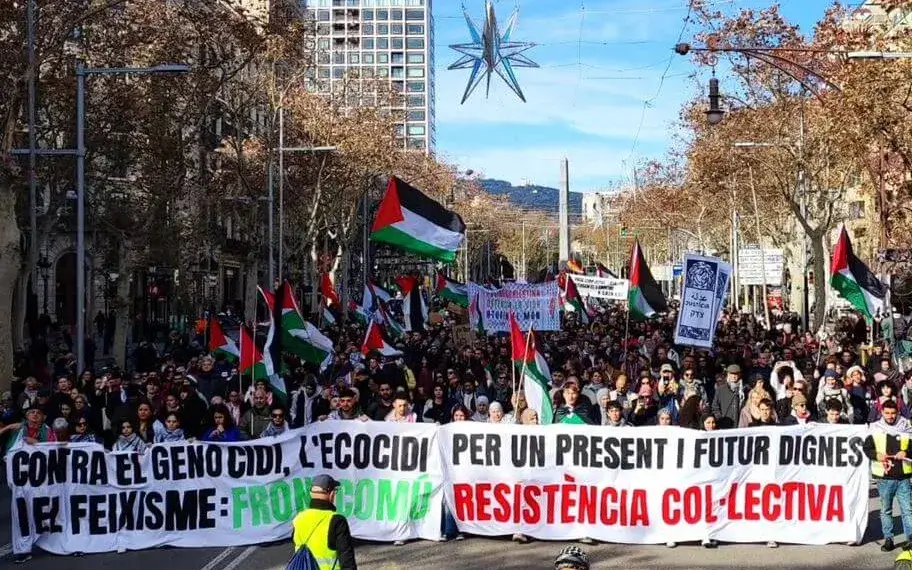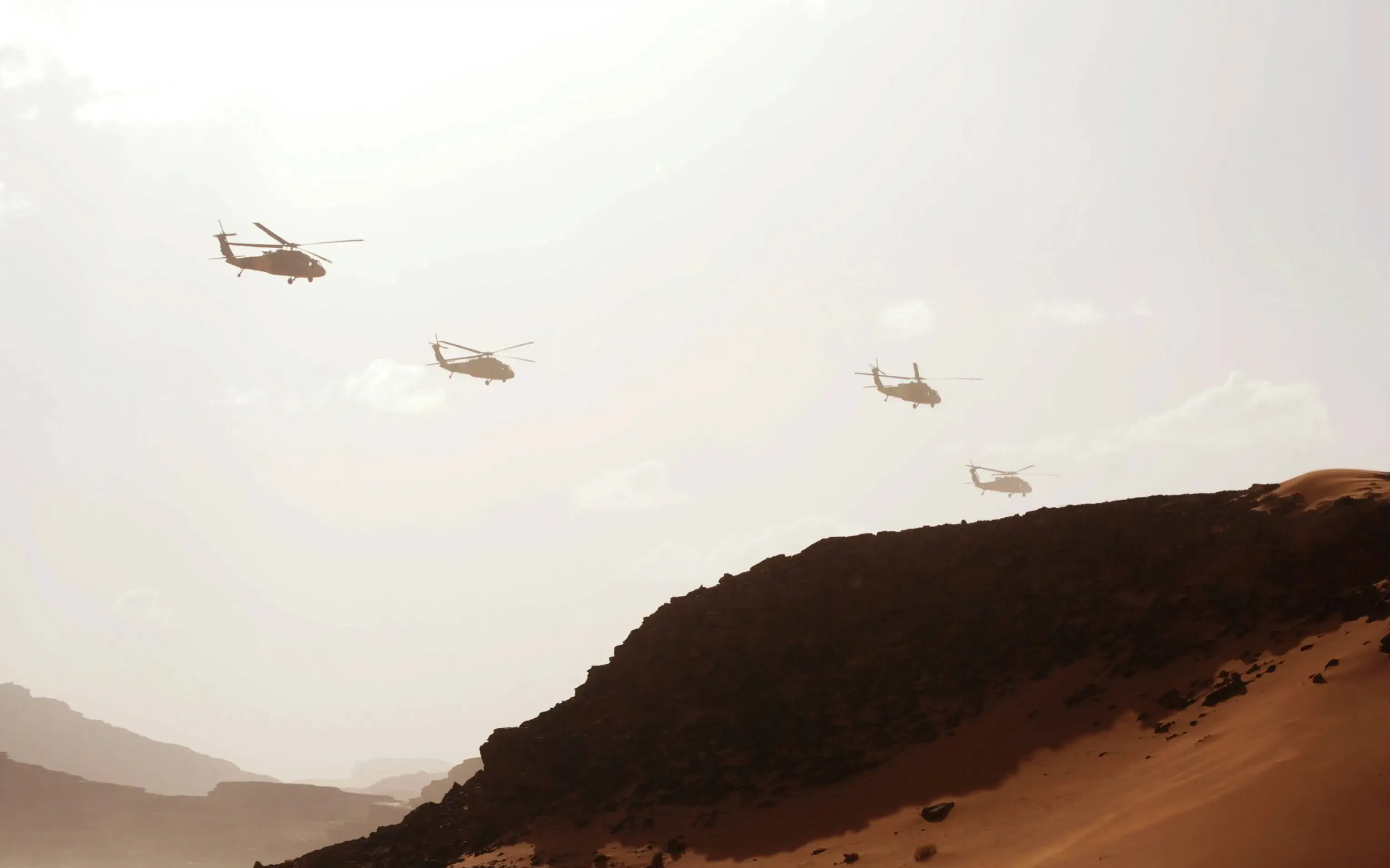An International Crisis Group report places the war in Ukraine as the most notable conflict on a global scale, but warns that other crises shaking the world should not be overlooked.
If we turn our attention to the year 2022 that we have just left behind, there is no doubt that the world's focus was directed towards Ukraine. The Russian invasion, bombings, refugees, Putin's flirtation with nuclear threat, or reactions to the aggression monopolized international news and relegated other conflicts that, despite not capturing the world's attention, continued actives.
The multiple global repercussions of the war that is being fought in the heart of Europe, and which continues to rage, herald an increasingly uncertain world and a tumultuous 2023. This is made clear by the International Crisis Group (ICG), which works to prevent wars and promote peacebuilding. Like every year, the organization has released a list of the most relevant conflicts that will require attention this year.
- War in Ukraine
The ICG's analysis of the conflict initiated by Russia is pessimistic regarding the possibility of an imminent end to the war. At this time, this conflict has already cost the lives of more than 240,000 people since it began nearly a year ago. Similarly, it should be noted that in 2022, one in three ukrainians were forced to flee their homes due to the war.
The organization points out that there are few signs so far that either side is willing to seriously initiate peace talks, a more understandable position for Ukraine, which is the country under attack and has regained ground as the conflict has progressed. Thus, in this context of deadlock, a long confrontation looms.
Ukraine is resisting thanks to the courage of its people and the help of the West, combined with poor planning by Russia, which has been forced to double down and mobilize an additional 300,000 men. This continuous escalation of the conflict by Putin, the ICG points out, is blocking his own exits towards a negotiated end to the confrontation.
Regarding the possibility of a potentially nuclear confrontation between NATO and Russia, the ICG highlights that both sides have sought to avoid direct confrontations that would lead to a catastrophic scenario.
Finally, the organization urges Western leaders, who have provided significant support to Ukraine, to keep the door open to an agreement that would end the conflict, making it clear to Russia the incentives it would gain in a peace scenario, such as the easing of massive international sanctions that are hurting the Russian economy.
- Armenia and Azerbaijan
In 2020, a six-week war broke out between Armenia and Azerbaijan for control of the border area of Nagorno-Karabakh. Azerbaijani forces expelled Armenians from the strategic enclave, which had been under Armenian control since 1990. The conflict, which caused about 7,000 soldiers to die, ended with a ceasefire sponsored by Russia.
More than two years after the confrontation, the ICG does not predict good prospects and considers that both sides are heading towards a new conflict. A scenario, moreover, in which the impact of the war in Ukraine could be very relevant due to the importance of Russia in the region.
The analysis points out that Azerbaijan is in a position of superiority and has strengthened compared to Armenia, which has not been able to accumulate military forces due to the lack of supplies affecting Russia, its ally.
Thus, several escalations of the conflict have occurred in the past year. Both Russia and the European Union have attempted to facilitate peace talks between the parties of the conflict, but the war in Ukraine has clouded relations and is making it difficult to find an acceptable way out of the confrontation, which is still far from being a reality.
- Iran
The outbreak of protests against the Iranian regime and its furious reaction, with an utterly disproportionate repression, along with Iran's support for Russia regarding the supply of weapons, has isolated the Islamic country more than ever.
According to the ICG, this popular expression of protest, led by women and young people, which the Iranian authorities identify as a foreign plot, is the greatest threat to the Islamic regime since the Green Movement of 2009. The fierce repression against the protesters is interpreted as a sign of weakness and fear by the regime.
Now, according to the document, the main challenge for those facing the regime is to gain the support of the Iranian middle class, as although much of it sympathizes with the protests, they fear the violence of the regime or a radical change.
In the midst of this situation, attention must also be paid to talks to reactivate the 2015 nuclear agreement, which have been stalled since September and are at a standstill. The ICG anticipates that the key moment when the United States and its allies will have to choose between the possibility of Iran acquiring the nuclear bomb or using force to prevent it seems to be increasingly imminent.
In this sense, October 2023, when the UN restrictions on Iranian ballistic missiles expire, is considered the peak moment to come. Therefore, the organization calls for joint efforts to keep the diplomatic door open, which is now very fragile, and to at least set some limits and generate space to reduce tension.
- Yemen
The ICG describes the current situation in the country, impacted by a seemingly endless war, as provisional, with a ceasefire agreement that expired in October and no fighting, but with both sides preparing to resume hostilities.
The conflict, which has been ongoing since 2015, pits the pro-government group of Abd Rabbuh Mansur Hadi, backed by an international coalition led by Saudi Arabia and supported by the United States, against the Houthi rebel faction, Shia and with connections to Iran.
The hopes that the UN-negotiated ceasefire would lead to a broader agreement have long since faded. Although fighting has not resumed and talks continue, tensions are rising, and both sides are accumulating military forces and equipment. Therefore, the risk of the war reactivating is increasingly high.
In this regard, the ICG advocates for a prolonged ceasefire, enabling talks between Yemenis, likely with UN mediation. However, it is considered the least likely scenario.
- Ethiopia
The conflict in the Ethiopian region of Tigray, one of the deadliest of 2022, which pits the government of Abiy Ahmed against the Tigray People's Liberation Front, is currently on hold. However, the ICG believes that this is a fragile calm, as key issues remain unresolved.
The conflict, interrupted by a ceasefire in March 2020 that ended in August, has resulted in staggering numbers: more than 385,000 civilian deaths and accusations of atrocities committed by both sides. This conflict is a mixture of elements such as ethnic hatred, territorial divisions, and the involvement of third parties such as the Eritrean government and the Ethiopian region of Amhara.
The South African city of Pretoria was the site of a ceasefire agreement favorable to the government of Abiy Ahmed, seeking a way out of the conflict, which is still ongoing. However, any minor dispute could be the spark that sets everything off again. The goodwill of the Ethiopian prime minister and, above all, the reaction of the Eritrean government may be crucial in consolidating the end of hostilities.
- The Democratic Republic of Congo (DRC) and the Great Lakes
The sudden resurgence of the M23, a previously inactive rebel group with the support of Rwanda, is causing havoc in the eastern part of the DRC. Beyond the number of deaths and displaced people, there is fear that all of this will lead to a wider regional war. According to the ICG, the revival of the M23 is due to tensions between the Great Lakes states and local dynamics.
This difficult context is further complicated by the general elections to be held in the DRC in 2023. The suspension of elections in the conflict-prone eastern part of the country is sure to cloud the results.
A military mission from East Africa, with Kenya playing a prominent role, is tasked with restoring calm to the region, pushing the M23 to a ceasefire, and getting them to return to peace talks with the Congolese government.
Therefore, Rwanda's involvement is expected to be essential, given its influence over the rebel group's leaders. All efforts are needed to open space for diplomacy and prevent the return of the conflicts that bled the region in the 1990s and 2000s.
- The Sahel
The region, and especially countries like Burkina Faso, Mali, and Niger, cannot withstand the onslaught of Islamist insurgencies and violence. Meanwhile, the West also does not know how to respond to coups in Mali and Burkina Faso.
In the latter country, jihadist groups control nearly 40% of the territory, and the fighting has caused thousands of deaths and at least two million people to be displaced from their homes. Additionally, Burkina Faso has experienced two coups in the last year, and the security forces are deeply divided.
Mali has also suffered two coups in 2020 and 2021, and the state has almost no presence in the north of the country, an area that is a scene of fighting between jihadist militants and mostly Tuareg rebel groups. In the central part of the country, there are also clashes marked by human rights violations. In Niger, jihadists are also gaining ground and getting closer to the capital.
External intervention, from the UN and countries like France, now seems focused on preventing jihadist groups from spreading south of the Gulf of Guinea. According to the ICG, the most important thing is for the region's leaders to reconsider the predominant military approach to confronting jihadist extremism and make efforts to improve community relations, win over the population, and engage in dialogue with militant leaders.
- Haiti
Haiti is immersed in a paralysis due to political stalemate and violent escalation by gangs following the assassination of President Jovenel Moïse in July 2021. In addition, public services are bankrupt, and cholera is spreading out of control. The current interim president, Ariel Henry, has international support, but faces strong Haitian resistance. This has prevented elections from taking place.
The gangs control more than half of the country, imposing terror and accumulating more power than they have had in decades. The unleashed violence has caused a humanitarian catastrophe in Haiti. Half of the population faces high levels of food insecurity, humanitarian workers cannot act, and there is a shortage of clean water, which has given rise to a cholera outbreak.
President Henry has requested foreign military support to combat the gangs, and much of the increasingly desperate population views this favorably, despite the disastrous precedents of foreign intervention in the past. However, few foreign countries seem willing to deploy troops to the country. Despite everything, it may be the only hope left for Haiti.
- Pakistan
The country faces a year of general elections amid strong political divisions, with former Prime Minister Imran Khan garnering popular support to challenge the government and the powerful Pakistani army. During his tenure, Khan fell out of favor with the army and claimed he was the victim of a U.S.-led plot to overthrow him before being removed from office.
The former prime minister and his party responded by using markedly anti-Western rhetoric, setting fire to the streets, and spreading violent protests across the country. In one of these protests, Khan was shot and blamed the head of the current coalition government, Shehbaz Sharif.
All of this, according to the ICG document, is a bad omen for this year's general elections. It is assumed that if he is defeated, Khan will not accept the election result, in which the army has promised to stay out of.
These political turbulences add to several crises impacting the country, such as those stemming from the devastating floods of 2022, which have affected the most vulnerable segments of the population. As a result, the country needs more help than ever before, and the fact is that it has taken too long to arrive. Moreover, the ICG warns of the resurgence of Islamist forces, attributed to the support they receive from the Taliban regime in Afghanistan.
- Taiwan
Taiwan is the point of greatest friction between the two great world powers, the United States and China. Washington wants to maintain its primacy in the region, while Beijing aims to reunify with the island, an objective for which it has made it clear that it does not rule out using force. On the other hand, the United States advocates for a peaceful resolution and is ambiguous about whether it would act in defense of Taiwan in the event of aggression.
In this context, the visit of then-Speaker of the United States House of Representatives Nancy Pelosi to Taiwan escalated the situation. The Asian giant responded with unprecedented military maneuvers around the island.
ICG sees it unlikely that China will cross the line and invade Taiwan, especially given the economic consequences and international rejection that Russia's invasion of Ukraine has generated. However, the United States must guarantee that its policy regarding the issue will not change and that it will not actively get involved in favor of permanent separation of Taiwan.
Anyway, new episodes like the one involving Pelosi could escalate tensions and power struggles, leading to demonstrations of force between China and the US. We are probably far from an immediate war, but it is important to avoid clashes in order to prevent an open conflict between the two most powerful nations in the world.









Add new comment